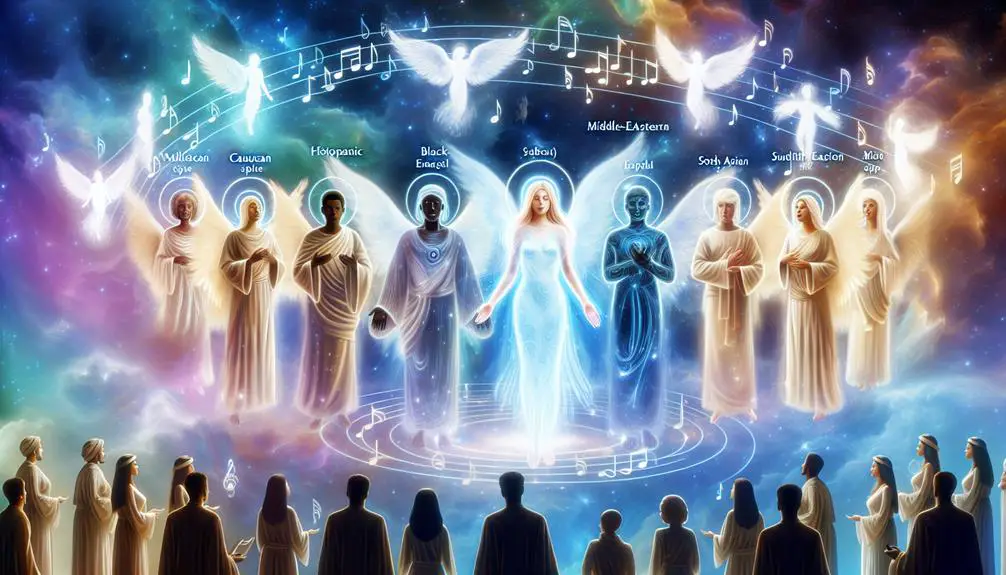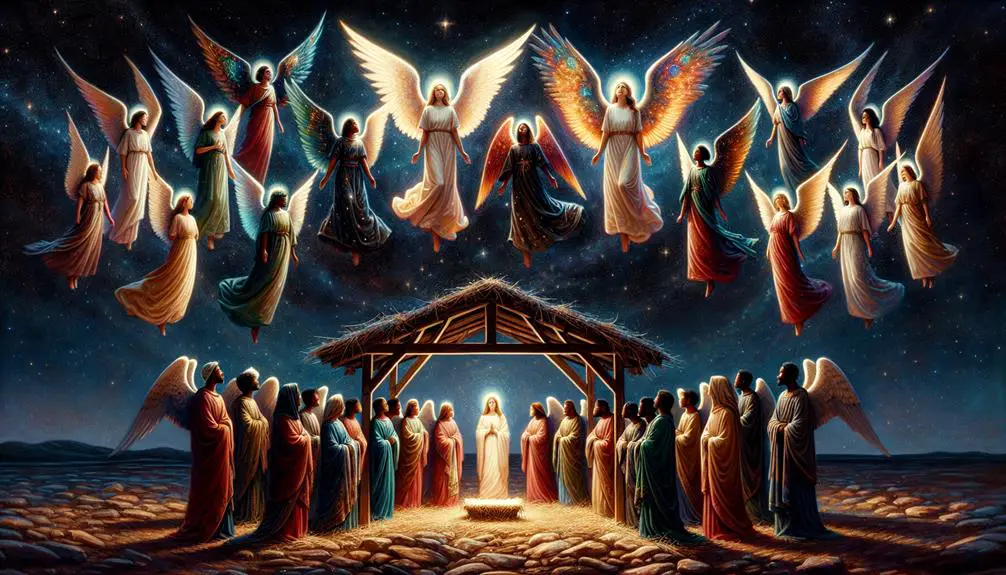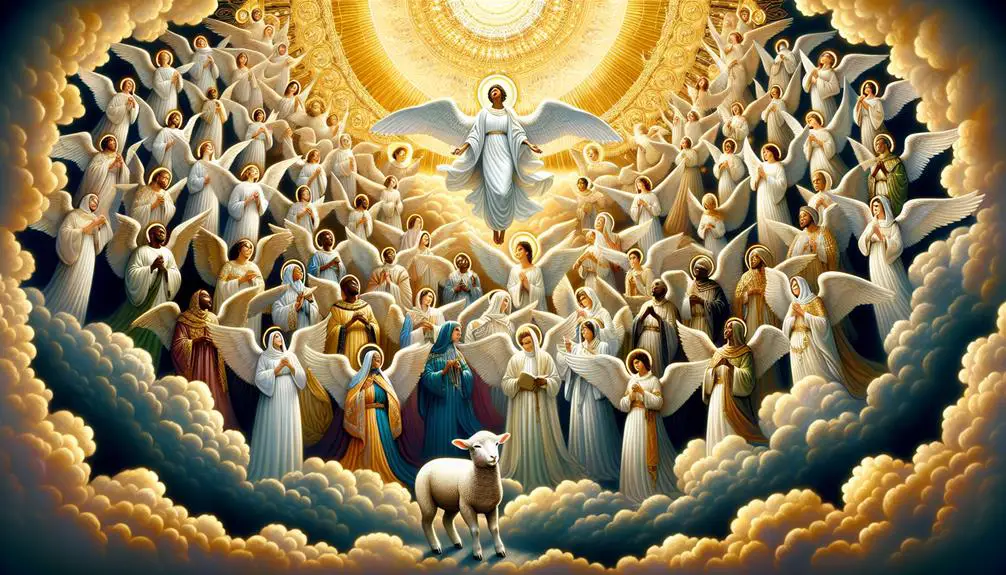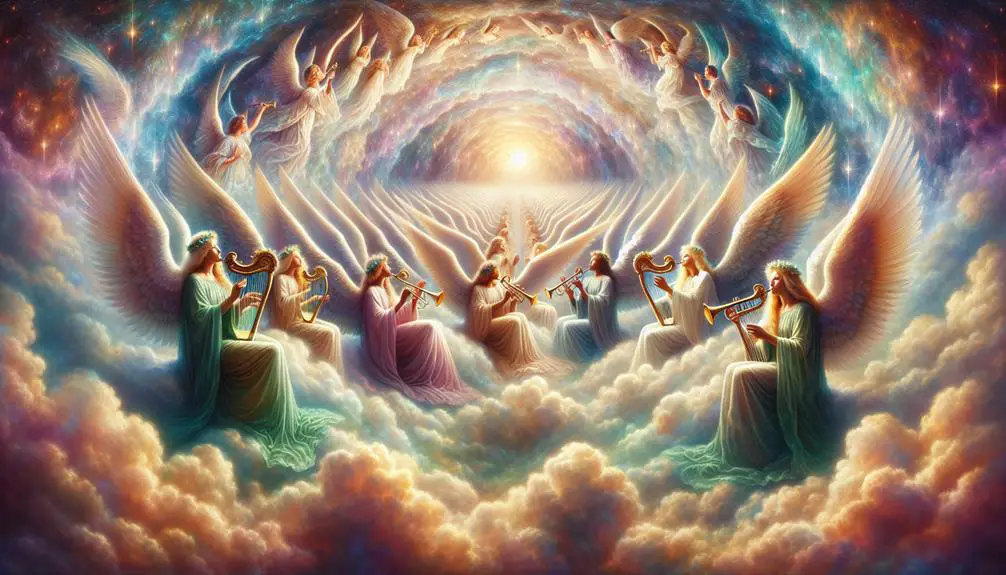Peek into the celestial realm where angels' songs reveal the depth of divine worship and glory, inviting a deeper exploration.

Angels Sing in the Bible
When you think about the nativity scene, the angelic choir announcing Jesus' birth to the shepherds in the fields of Bethlehem likely comes to mind. This iconic moment, celebrated in countless carols and Nativity plays, highlights the pivotal role angels and their songs play within the biblical narrative.
Yet, this is just the tip of the iceberg. As you explore further, you'll find that these celestial beings' contributions to divine celebrations and moments of revelation offer a deeper insight into their significance.
It begs the question: what are the broader implications of these divine melodies on our understanding of worship and the glory of God?
Key Takeaways
- Angelic songs in the Bible signify divine presence and pivotal moments in salvation history.
- Music by celestial beings serves as a bridge between the divine and human realms.
- Angelic choirs, playing instruments and singing, express God's majesty and messages.
- Biblical narratives use angelic music to convey theological truths and divine interventions.
The Significance of Angelic Songs

Angelic songs in the Bible serve as pivotal moments, marking significant divine interventions and revelations to humanity. These celestial symphonies, often overlooked, carry profound theological and philosophical implications. They're not merely background music; they represent the voice of the divine, communicating through angelic harmonies. When angels sing, it's an auditory manifestation of God's presence and actions in the world.
The significance of these songs lies not just in their beauty but in their timing and context. They signal moments of transition, assurance, and prophecy. For instance, angelic songs are found at crucial junctures in biblical narratives, where they underscore the import of what's happening or about to unfold. They act as a bridge between the divine and the human, making the ineffable accessible through the universal language of music.
Analyzing these angelic harmonies reveals a layered understanding of divine communication. The songs aren't random; they're meticulously placed to highlight moments of divine grace, judgment, or covenant. They serve as both a herald and a reminder of God's ongoing engagement with humanity.
Moreover, these celestial symphonies invite you to reflect on the nature of divine revelation. They suggest that God's messages aren't always in the form of direct speech or visible miracles but can also be conveyed through the sublime beauty of music. This implies a multifaceted approach to divine revelation, where auditory experiences are as significant as visual or verbal ones.
In essence, angelic songs in the Bible aren't just musical interludes. They're critical components of divine revelation, offering insights into God's nature, intentions, and interactions with humanity. Through these angelic harmonies, you're invited to perceive the divine in a profoundly nuanced way.
Angelic Choirs at Christ's Birth

One of the most celebrated instances of angelic choirs in the Bible occurs at the birth of Christ, marking a significant moment of divine-human interaction. This event, rich in theological symbolism, captures the attention of scholars and believers alike, owing to its depiction of celestial beings engaging directly with mankind. The narrative, primarily located in the Gospel of Luke, describes how shepherds, tending their flocks by night, become the first human witnesses to the incarnation through the announcement by an angelic host.
The shepherds' witness to the angelic choirs is a pivotal moment that underscores the humility and universal message of Christ's birth. Their social status as shepherds, considered lowly in the societal hierarchy of the time, emphasizes the inclusiveness of the divine message, signifying that salvation is accessible to all, irrespective of social standing. The angels' message, 'Glory to God in the highest, and on earth peace, goodwill toward men,' encapsulates the essence of the Christian gospel, heralding a new era of divine grace and reconciliation between God and humanity.
Furthermore, the star that guides the Magi to Bethlehem, commonly associated with the nativity story, serves as a celestial symbol complementing the angelic announcement. The star's symbolism extends beyond a mere navigational aid; it represents divine guidance and the light of Christ illuminating the world. This convergence of celestial phenomena—angelic choirs and the guiding star—highlights the cosmic significance of Christ's birth, suggesting a universe attuned to and celebrating this pivotal moment in salvation history.
In analyzing the angelic choirs at Christ's birth, one appreciates the depth of its theological and symbolic dimensions, offering insights into the nature of divine-human relations as portrayed in biblical narratives.
Revelation: The Heavenly Chorus

In the Book of Revelation, the heavenly chorus's depiction serves as a profound exploration of eschatological themes, illustrating the culmination of divine worship and judgment. This narrative segment stands as a pivotal moment where heavenly harmonies and choir origins converge, offering a vivid portrayal of celestial worship that transcends earthly bounds. The text not only invites readers into a majestic realm of divine music but also underscores the cosmic scope of God's salvific plan, as manifested through the harmonious praise of the angelic hosts.
To conjure imagery of this celestial celebration, consider these elements:
- The Multitude of Voices: Envision countless angels, each contributing to an overwhelming symphony of praise, their voices blending in perfect harmony to worship God and the Lamb.
- The Diversity of Participants: Angels, elders, and living creatures, each playing a distinct role in this heavenly choir, underscore the universal nature of divine worship.
- The Instruments of Praise: Harps and other heavenly instruments accompany the choir, adding layers of rich, melodious textures to the heavenly harmonies.
- The Content of Their Songs: Songs of redemption, power, and worthiness directed towards God and the Lamb, encapsulating key theological themes of Revelation.
This portrayal not only enriches our understanding of eschatological worship but also invites reflection on the origins and significance of heavenly music. The choir's composition and the content of its praise reflect a deep-rooted tradition of worship that transcends the earthly realm, pointing towards a future where all creation joins in harmonious adoration of the divine.
The Role of Music in Worship

Reflecting on the heavenly choirs described in Revelation offers a unique perspective on the integral role music plays in worship practices across various traditions. This observation underscores how musical instruments and vocal harmonies have been pivotal in facilitating a connection with the divine.
You'll find that the evolution of worship is deeply intertwined with the development of musical expression. From ancient psalms to contemporary praise bands, the progression mirrors changes in societal values, technological advancements, and theological understanding.
The use of musical instruments in worship settings, for instance, has significantly evolved. Early Christian gatherings might've primarily featured vocal music, reflecting the practices of their Jewish roots where instruments were often reserved for temple worship. As Christianity spread and diversified, so did its musical expressions, incorporating organs, guitars, and other instruments to enhance the worship experience. This evolution wasn't just a matter of preference but reflected a deeper theological shift towards viewing all of creation as capable of glorifying God.
Analyzing worship evolution reveals a consistent theme: music's power to transcend ordinary communication, touching the heart and soul in ways words alone cannot. It's a medium through which the collective emotions, aspirations, and prayers of a community are offered up to the divine. Whether through the simple strumming of a guitar or the complex harmonies of a choir, music in worship acts as a bridge between the human and the divine, echoing the heavenly choirs described in Revelation, and thus, underscoring its timeless and universal appeal.
Angels and the Glory of God

You'll find that angels not only serve as messengers of God's majesty but also embody the divine glory themselves. Their presence in biblical narratives often accompanies the manifestation of God's grandeur, especially through the harmonious praises of heavenly choirs.
These instances highlight the intricate relationship between angelic beings and the representation of God's glory.
Angels Reflect Divine Glory
Angels serve as luminous conduits, casting the divine glory of God into the human realm. They're not just divine messengers but embodiments of celestial magnificence, reflecting the majesty and holiness of the Creator. Their presence is often accompanied by seraphic harmony, underscoring their role in the divine order.
To visualize their role, consider:
- Illumination: Angels radiate light, symbolizing divine wisdom and truth.
- Protection: They shield believers, manifesting God's care and concern.
- Guidance: Through divine messages, they provide direction, reflecting God's will.
- Worship: Their perpetual adoration of God models perfect devotion.
This perspective underscores angels' significance in the celestial hierarchy, highlighting their function as reflectors of God's glory, aligning with divine purposes.
Heavenly Choirs Praise God
In the annals of biblical literature, heavenly choirs praising God emerge as a significant motif, illustrating the profound connection between angelic beings and divine glory. These narratives, rich in angel harmonics, serve not merely as artistic embellishments but as theological assertions about the nature and purpose of these celestial entities.
The origins of these choirs can be traced back to early Judaic traditions, which conceptualized angels as God's ministers, their voices uniting in cosmic harmony to glorify the Creator. This depiction underscores the idea that praise and worship are fundamental to the existence of angels, positioning them as exemplars of devotion.
Through their ceaseless adoration, these heavenly choirs articulate an eternal truth: God's magnificence is both the source and the subject of their existence.
Messengers of God's Majesty
Building on the understanding of heavenly choirs, it's essential to explore how angels, as messengers, embody God's majesty through their actions and revelations. Celestial beings serve as divine messengers, illuminating the depth of God's glory and power. Their interactions with humanity provide a glimpse into the divine, transcending the ordinary to reveal the extraordinary.
- Announcing significant events, such as the birth of Christ, showcasing their role in pivotal moments of divine intervention.
- Guiding individuals towards their divine purpose, illustrating the personal aspect of God's guidance.
- Delivering messages of hope and warning, reflecting God's concern for humanity's welfare.
- Displaying supernatural abilities that affirm their origin from the divine realm, further cementing their role as emissaries of the Almighty.
Through these actions, angels underscore the magnificence of God's majesty, bridging the divine and the earthly.
Biblical Depictions of Divine Melodies

Throughout the Bible, divine melodies serve as a powerful testament to the presence and actions of the divine, marking significant moments and conveying celestial messages. The depiction of angelic instruments and seraphic harmonies underscores the transcendent and supernatural aspect of these divine communications. The use of music and song by celestial beings not only emphasizes their holiness but also their role as messengers and worshipers of God.
Your exploration into the biblical depictions of divine melodies reveals a rich tapestry of angelic music that transcends human understanding. The Bible paints a vivid picture of these heavenly sounds, often associated with significant theological events. This table provides a structured overview of key instances and descriptions:
Example |
Description |
Significance |
|---|---|---|
Revelation 5:8-9 |
Angels play harps and sing a new song. |
Worship and adoration of the Lamb. |
Isaiah 6:1-3 |
Seraphim call to one another in song. |
Holiness of God. |
Luke 2:13-14 |
Angelic chorus praises God at Jesus' birth. |
Announcement of the Messiah. |
Job 38:7 |
Morning stars sing together. |
Celebration of creation. |
Psalm 148 |
Heavenly hosts commanded to praise God. |
Cosmic call for worship. |
This analysis helps you appreciate the depth and complexity of divine melodies as depicted in the Bible. It invites you to consider the multifaceted ways in which music and song serve as a bridge between the divine and the human, carrying messages of worship, celebration, and revelation.
Understanding Celestial Celebrations

Delving into the realm of celestial celebrations, you'll find that these events symbolize profound theological truths and divine moments of joy and worship. In these instances, celestial harmonies and angelic instruments aren't merely elements of a grand spectacle; they're expressions of the divine will and the interconnectedness of creation. Understanding these celebrations requires an appreciation for their complexity and significance.
To create imagery in your mind, consider the following:
- Harps of Gold: Envision angels strumming harps of unimaginable beauty, their melodies weaving through the fabric of the heavens, creating ripples of divine energy. These aren't just instruments; they're symbols of harmony and the eternal music of the cosmos.
- Choirs Beyond Number: Imagine countless angels, each with a voice more pure than the clearest spring, joining in a chorus that transcends time and space. This isn't merely singing; it's a declaration of the glory and majesty of the Creator.
- Trumpets of Triumph: Picture celestial beings heralding significant events in salvation history with trumpets that resonate across the universe. These sounds don't just announce; they transform and proclaim the unfolding of God's plan.
- Drums of Divine Order: Think of the rhythmic beats that underscore the cosmic dance of creation, reminding all of the ongoing work of redemption and the ultimate victory of good over evil.
These elements of celestial celebrations aren't just for show. They're deeply embedded with theological significance, each angelic instrument and harmony playing a role in the divine narrative. Through them, you're invited to ponder the mysteries of faith and the boundless joy of the divine realm.
Frequently Asked Questions
Do Angels Have Specific Vocal Attributes or Harmonies That Differentiate Them From Human Singers?
You're likely curious if there's something unique about angelic voices compared to human ones. Indeed, discussions often point to vocal purity and celestial acoustics as distinguishing features. These terms suggest angels possess a distinct clarity and a resonance that transcends earthly sounds.
Analyzing this, it's not just about pitch or volume but a profound difference in the texture and emotional impact of the sound, setting angelic harmonies apart from human singers.
How Do Cultural Interpretations of Angels' Singing Vary Outside the Judeo-Christian Tradition?
You'll find that cultural interpretations of angelic singing differ significantly across traditions.
In Islamic perspectives, angels are known to praise God, but their vocal expressions aren't always described as singing in the way you might expect.
Hindu mythology, on the other hand, doesn't center on angels singing but has celestial beings who perform music and songs that carry divine messages.
These variations highlight the rich tapestry of beliefs surrounding celestial messengers and their ways of communication.
Are There Any Accounts or Traditions That Suggest Humans Have Directly Participated in or Co-Created Music With Angels, According to Biblical or Extra-Biblical Texts?
You're exploring whether humans have ever joined or co-created music with angelic choirs, focusing on biblical or extra-biblical sources.
While explicit accounts of human-angelic collaboration in creating music are scarce, some interpretations suggest metaphorical or spiritual instances of such interactions. Scholars debate the extent to which these narratives indicate literal events versus allegorical teachings.
The idea fascinates many, blending the divine with the human in a harmonious collaboration.
In the Context of Angelic Music, How Is the Concept of Musical Instruments Portrayed or Utilized in the Bible?
You're barking up the right tree if you're exploring how the Bible portrays musical instruments. Heavenly instruments aren't just background noise; they're steeped in musical symbolism, showcasing divine messages or events.
For instance, trumpets in Revelations signal apocalyptic events, reflecting their power beyond mere melody. Analyzing these instances, it's evident that instruments serve as more than accompaniments; they're vital, symbolic elements in the biblical narrative, encapsulating celestial and prophetic themes.
Have There Been Any Significant Historical Figures or Theologians Who Reported Personal Experiences or Visions Related to Angels Singing, and How Have These Influenced Theological Thought?
You're delving into reports of angelic encounters and mystical experiences by historical figures and theologians. These individuals have often claimed to witness angels singing, profoundly influencing theological thought. Their accounts, rich in vivid descriptions and interpretations, provide unique insights into the celestial realm's influence on human spirituality.
Such testimonies haven't only enriched our understanding of mystical experiences but also shaped the discourse on angelology and the supernatural within academic and religious circles.
Conclusion
In a celestial twist of irony, while we strain to hear the faintest divine whisper, angels are conducting grand symphonies in the heavens. Your daily commute's silence echoes with the remnants of angelic choirs, unseen yet pervasive.
This cosmic concert, a testament to the glory of God, unfolds unnoticed as we plug into our earthly playlists, oblivious to the divine melodies that underscore our existence. Thus, in our quest for spiritual enlightenment, we're ironically out of tune with the very harmonies that could guide us.



Sign up